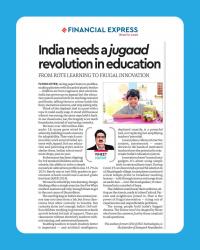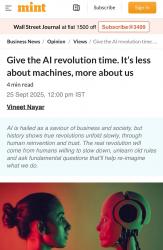The OPED Article published on Financial Express dated 8th Dec'25 explores how, despite children being naturally curious and inventive, our education system increasingly restricts that instinct by emphasising silence, memorisation, and compliance.

“In an environment where companies’ risk appetite is reducing dramatically, my generation has no right to ask about peoples’ ambition—as ambition only comes from opportunity,” said 63-year-old Vineet Nayar, the former CEO of HCL Technologies, now on the board of the National Stock Exchange.

Vineet Nayar, Founder, Sampark Foundation & former CEO of HCL Technologies, looks at the change through a generational lens. The Gen Z workforce, with abundant opportunities, is amplifying the demand for authenticity and purpose. For them, leadership is not about charisma or showmanship, but about alignment between values and action.

Vineet Nayar, former CEO and vice-chairman of HCL Technologies, is known for transforming the IT company from a fledgling $700 million to a $5 billion company through an employee-first strategy. He put the employees first and the customers second.

Artificial intelligence (AI) will not save us. But people using AI might. Everywhere I go, I hear the same breathless excitement. Generative AI is hailed as the new saviour. Some worship it as the ultimate game-changer. Others whisper about disruption and doom. Valuations climb, pilot projects multiply and everyone seems desperate to be the first to claim they’ve cracked the AI code.


